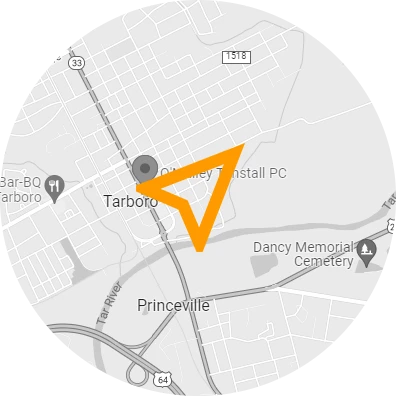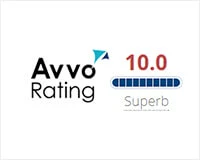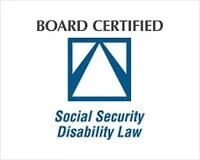Navigating the complex landscape of Social Security Disability (SSD) laws can be overwhelming, especially when you’re already dealing with a debilitating medical condition. Understanding these laws is important for successfully securing the benefits you need and deserve. At O’Malley Tunstall, PC, our board-certified Social Security Disability specialists have decades of experience helping Raleigh residents interpret these laws, prepare comprehensive applications, and successfully appeal denied claims to secure the benefits they need to maintain their quality of life.
Key Takeaways
- The Social Security Administration’s definition of disability requires that your condition prevents substantial gainful activity and is expected to last at least 12 months or result in death.
- Approximately half of all initial SSD applications are denied, making knowledge of the appeals process essential for securing benefits.
- SSD eligibility depends on both medical criteria and earning sufficient work credits through your employment history.
- Contact O’Malley Tunstall, PC at (919) 277-0150 for a free consultation with our board-certified Social Security Disability specialist.
Understanding the SSA’s Definition of Disability
What Qualifies as a Disability Under Social Security Law

Social Security Disability law is built around how the SSA defines disability: a medically proven physical or mental condition that prevents a person from performing substantial work and is expected to last at least 12 months or lead to death.
To meet this standard, you must demonstrate that:
- You have a medically determinable physical or mental impairment.
- Your impairment prevents you from performing substantial gainful activity.
- Your condition has lasted or is expected to last at least 12 months or result in death.
- You cannot adjust to other work considering your age, education, and experience.
At O’Malley Tunstall, PC, our attorneys have extensive experience in interpreting these requirements and building strong cases that meet the SSA’s strict definition.
The Difference Between “Severe” and “Non-Severe” Impairments

Once the SSA establishes that you have a medically determinable impairment, they then consider whether your impairment is “severe.” An impairment is considered severe if it significantly limits your ability to perform basic work activities.
Examples of basic work activities include:
- Walking, standing, sitting, lifting, or carrying.
- Understanding and following simple instructions.
- Responding appropriately to supervision and coworkers.
- Dealing with changes in routine.
The Five-Step Sequential Evaluation Process

How the SSA Determines Disability
The SSA uses a standardized five-step process to evaluate disability claims:
- Are you working? If you are engaged in substantial gainful activity (earning more than a certain amount per month), you will not be considered disabled regardless of your medical condition.
- Is your condition “severe”? Your impairment must significantly limit your ability to perform basic work-related activities.
- Does your condition meet or equal a listed impairment? The SSA maintains a “Blue Book” of impairments that automatically qualify as disabling if you meet all the criteria.
- Can you perform your past work? If your condition doesn’t meet a listing, the SSA determines if you can still perform any of your past jobs.
- Can you perform any other type of work? If you cannot perform your past work, the SSA considers whether you can adjust to other work based on your age, education, past work experience, and transferable skills.
Our experienced attorneys know exactly what the SSA looks for at each step and how to navigate this complex evaluation.
Eligibility Requirements for Social Security Disability Benefits

Work Credits and Financial Eligibility
Beyond the medical requirements, eligibility for Social Security Disability Insurance (SSDI) depends on your work history and the Social Security credits you’ve earned.
Generally, you need:
- 40 credits total, with 20 earned in the last 10 years ending with the year you became disabled (younger workers may qualify with fewer credits).
- One credit is earned for each quarter you work and pay Social Security taxes (maximum of 4 credits per year).
For those without sufficient work credits, Supplemental Security Income (SSI) provides an alternative. SSI is a needs-based program for disabled individuals with limited income and resources.
Medical Documentation Requirements
Proper medical documentation is the foundation of a successful disability claim.
The SSA requires:
- Clinical findings from acceptable medical sources.
- Laboratory test results.
- Treatment history and response to treatment.
- Detailed descriptions of how your condition limits your activities.
The Application and Appeals Process
Filing Your Initial Application
You can apply for Social Security Disability benefits at any Social Security office in your area, or it can be done by mail or phone. We recommend applying as soon as you become disabled, as the process can take several months.
When filing your application, you’ll need to provide:
- Detailed medical information.
- Work history.
- Personal identification.
- Financial information (particularly for SSI claims).
Navigating the Appeals Process
Approximately half of all initial disability applications are denied, but this doesn’t mean you should give up.
The appeals process includes several levels:
- Reconsideration: Your case is reviewed by a different examiner than who made the initial decision.
- Administrative Law Judge (ALJ) Hearing: This is often your best opportunity to present your case in person.
- Appeals Council Review: If the ALJ denies your claim, you can request a review by the Appeals Council.
- Federal Court: As a last resort, you can file a lawsuit in Federal Court.
Each level has strict deadlines—typically 60 days from receiving a denial notice. Our attorneys represent clients at all levels of appeal, from reconsideration to federal court litigation.
Special Considerations in Social Security Disability Law

Rules for Specific Age Groups
Social Security Disability laws recognize that older workers may have more difficulty adapting to new types of work. The SSA applies special rules for applicants aged 50 and older, often making it easier to qualify for benefits.
These rules, known as the “Medical-Vocational Guidelines” or “Grid Rules,” consider factors such as:
- Age (50-54, 55-59, and 60+).
- Education level.
- Work experience.
- Transferable skills.
Mental Health Disabilities
Conditions such as depression, anxiety, bipolar disorder, and schizophrenia can be just as debilitating as physical conditions but often require different types of documentation.
The SSA evaluates mental disorders based on:
- Symptoms and diagnosis.
- Functional limitations in daily activities.
- Social functioning.
- Concentration, persistence, and pace.
- Episodes of decompensation.
At O’Malley Tunstall, PC, we have experience handling complex mental health disability claims and know how to properly document these often-invisible impairments.
Contact O’Malley Tunstall, PC for Social Security Disability Representation
Understanding Social Security Disability laws is crucial for securing the benefits you deserve. O’Malley Tunstall, PC provides experienced legal representation to help you navigate these complex regulations.
Don’t struggle with the intricate disability laws alone—contact our team today:
- Phone: (919) 277-0150
- Free Case Evaluation: Click here to schedule your consultation
- Address: 8300 Falls of Neuse Road, Raleigh, NC 27615
Frequently Asked Questions
What is the Social Security disability rule?
According to the Social Security Administration (SSA), to qualify for disability benefits, you must have a medically identifiable physical or mental impairment that prevents you from engaging in substantial gainful activity and is expected to last at least 12 months or result in death. At O’Malley Tunstall, PC, we help clients understand whether their condition meets this strict definition and how to properly document their limitations to the SSA.
What makes someone eligible for Social Security disability?
Eligibility for SSD benefits requires that you have a medically determinable impairment that prevents you from performing any substantial gainful activity and that your condition is expected to last at least 12 months or result in death, along with having sufficient work credits and supporting medical documentation.
What law firm offers legal help for Social Security disability benefits?
O’Malley Tunstall, PC provides expert legal representation for Social Security Disability claims throughout Eastern North Carolina. With a board-certified specialist in Social Security Disability law and decades of experience, our firm has the knowledge and resources to help you secure the benefits you deserve. Call us at (919) 277-0150, visit our contact page to schedule a free consultation, or visit our office at 8300 Falls of Neuse Road, Raleigh, NC 27615.















